The WPJ
THE WORLD PROPERTY JOURNALReal Estate Facts Not Fiction
Residential Real Estate News

9.1 Million U.S. Homes Still 'Underwater', Down 26 Percent
Residential News » North America Residential News Edition | By Michael Gerrity | April 17, 2014 9:00 AM ET
According to RealtyTrac's latest U.S. Home Equity & Underwater Report for the first quarter of 2014, 9.1 million U.S. residential properties were seriously underwater -- where the combined loan amount secured by the property is at least 25 percent higher than the property's estimated market value -- representing 17 percent of all properties with a mortgage in the first quarter.
- 17 Percent of U.S. Properties Seriously Underwater, Down From 26 Percent Year Ago
- 9.9 Million Properties With 50 Percent Equity or More, Up From 9.1 Million in Q4 2013
- 35 Percent of Residential Properties in Foreclosure Process With Positive Equity
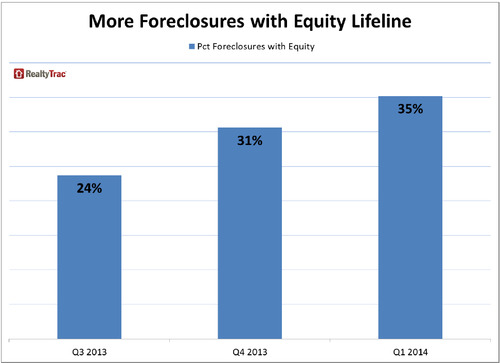 The first quarter negative equity numbers were down to the lowest level since RealtyTrac began reporting negative equity in the first quarter of 2012. In the fourth quarter of 2013, 9.3 million residential properties representing 19 percent of all properties with a mortgage were seriously underwater, and in the first quarter of 2013 10.9 million residential properties representing 26 percent of all properties with a mortgage were seriously underwater. The recent peak in negative equity was the second quarter of 2012, when 12.8 million U.S. residential properties representing 29 percent of all properties with a mortgage were seriously underwater.
The first quarter negative equity numbers were down to the lowest level since RealtyTrac began reporting negative equity in the first quarter of 2012. In the fourth quarter of 2013, 9.3 million residential properties representing 19 percent of all properties with a mortgage were seriously underwater, and in the first quarter of 2013 10.9 million residential properties representing 26 percent of all properties with a mortgage were seriously underwater. The recent peak in negative equity was the second quarter of 2012, when 12.8 million U.S. residential properties representing 29 percent of all properties with a mortgage were seriously underwater.The universe of equity-rich properties -- those with at least 50 percent equity -- grew to 9.9 million representing 19 percent of all properties with a mortgage in the first quarter, up from 9.1 million representing 18 percent of all properties with a mortgage in the fourth quarter of 2013.
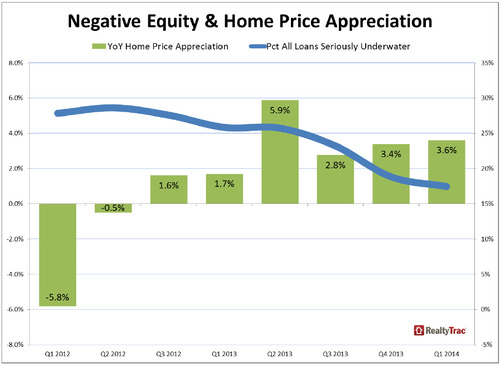 RealtyTrac also reports another 8.5 million properties were on the verge of resurfacing in the first quarter, with between 10 percent negative equity and 10 percent positive equity. This segment represented 16 percent of all properties with a mortgage in the first quarter. That was compared to 8.3 million properties representing 17 percent of all properties with a mortgage in the fourth quarter of 2013.
RealtyTrac also reports another 8.5 million properties were on the verge of resurfacing in the first quarter, with between 10 percent negative equity and 10 percent positive equity. This segment represented 16 percent of all properties with a mortgage in the first quarter. That was compared to 8.3 million properties representing 17 percent of all properties with a mortgage in the fourth quarter of 2013.Fewer distressed properties had negative equity in the first quarter, with 45 percent of all properties in the foreclosure process seriously underwater -- down from 48 percent in the fourth quarter of 2013 and down from 58 percent in the first quarter of 2013. Conversely, the share of foreclosures with positive equity increased to 35 percent in the first quarter, up from 31 percent in the fourth quarter and up from 24 percent in the third quarter of 2013.
"U.S. homeowners are continuing to recover equity lost during the Great Recession, but the pace of that recovering equity slowed in the first quarter, corresponding to slowing home price appreciation," said Daren Blomquist, vice president at RealtyTrac. "Slower price appreciation means the 9 million homeowners seriously underwater could still have a long road back to positive equity.
"The relatively high percentage of foreclosures with equity is surprising to many because it would seem homeowners with equity could easily avoid foreclosure by leveraging that equity by refinancing or with an equity sale of the home," Blomquist noted. "But many distressed homeowners with equity may not realize they have equity and in some cases have vacated the property already, assuming that foreclosure is inevitable."
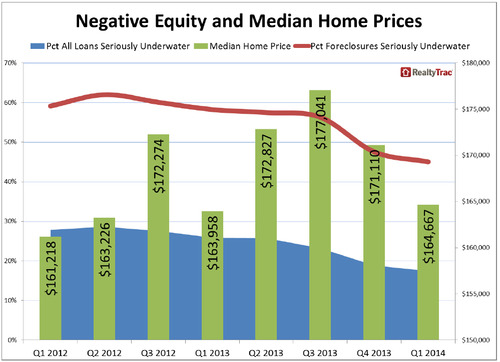 "Underwater properties have become an insignificant part of the housing market in Orange County," said Chris Pollinger, senior vice president of sales at First Team Real Estate, covering the Southern California market. "Out of the nearly 40,000 properties we currently have listed only about 3,000 of those are distressed or short sale properties, proving that the continual rise in home prices is relieving the housing market of underwater homeowners."
"Underwater properties have become an insignificant part of the housing market in Orange County," said Chris Pollinger, senior vice president of sales at First Team Real Estate, covering the Southern California market. "Out of the nearly 40,000 properties we currently have listed only about 3,000 of those are distressed or short sale properties, proving that the continual rise in home prices is relieving the housing market of underwater homeowners."Markets with most negative equity
States with the highest percentage of residential properties seriously underwater in the first quarter were Nevada (34 percent), Florida (31 percent), Illinois (30 percent), Michigan (29 percent), and Ohio (27 percent).
Major metropolitan statistical areas (population 500,000 or more) with the highest percentage of residential properties seriously underwater were Las Vegas (37 percent), Lakeland, Fla., (36 percent), Palm Bay-Melbourne-Titusville, Fla., (35 percent), Cleveland (35 percent), Akron, Ohio (34 percent), and Detroit (33 percent).
Markets with most resurfacing equity
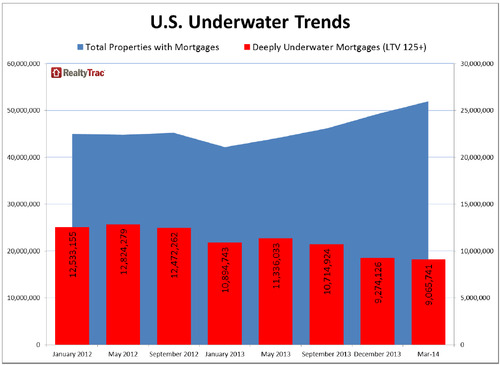 Major metro areas with the highest percentage of resurfacing equity -- between negative 10 percent and positive 10 percent -- were Louisville, Ky., (37 percent), Columbia, S.C. (28 percent), Colorado Springs, Colo., (28 percent), Little Rock, Ark., (28 percent), and Tulsa, Okla., (27 percent).
Major metro areas with the highest percentage of resurfacing equity -- between negative 10 percent and positive 10 percent -- were Louisville, Ky., (37 percent), Columbia, S.C. (28 percent), Colorado Springs, Colo., (28 percent), Little Rock, Ark., (28 percent), and Tulsa, Okla., (27 percent)."Homeowners are no longer underwater on their homes like they were at the peak of 2012," said Sheldon Detrick, CEO of Prudential Detrick/Alliance Realty, covering the Oklahoma City and Tulsa, Okla., markets. "Low housing inventory and more buyers are causing home prices to rise and sell over list price, giving homeowners who are moderately underwater a chance to avoid the foreclosure process."
Markets with most equity-rich properties
Major metro areas with the highest percentage of equity rich properties -- those with at least 50 percent equity -- were San Jose, Calif., (39 percent), Honolulu (35 percent), San Francisco (35 percent), Poughkeepsie, N.Y., (34 percent), and Los Angeles (32 percent).
Markets with most positive-equity foreclosures
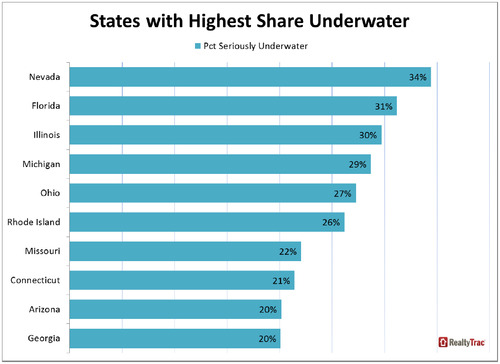 Major metro areas with more than 50 percent of properties in foreclosure with equity included Denver (64 percent), Boston (58 percent), Minneapolis (58 percent), Houston (54 percent), and Washington, D.C. (52 percent).
Major metro areas with more than 50 percent of properties in foreclosure with equity included Denver (64 percent), Boston (58 percent), Minneapolis (58 percent), Houston (54 percent), and Washington, D.C. (52 percent)."Home prices continue to rise due to record-low inventory levels. Our median closing price is now up to $313,846, which is substantially higher than it was a year ago, so there is no question that there are significantly fewer people who are underwater on their homes," said Phil Shell, a managing broker at RE/MAX Alliance, covering the Denver, Colo. market.
"The short sale market really dried up about nine months ago, but we do still see some short sale transactions with higher-priced homes in the $700,000 to $800,000 plus range," added Heidi Greer, also a managing broker at RE/MAX Alliance.
Sign Up Free | The WPJ Weekly Newsletter
Relevant real estate news.
Actionable market intelligence.
Right to your inbox every week.
Real Estate Listings Showcase
Related News Stories
Residential Real Estate Headlines
- More Americans Opting for Renting Over Homeownership in 2024
- BLOCKTITLE Global Property Tokenization Platform Announced
- Small Investors Quietly Reshaping the U.S. Housing Market in Late 2024
- Greater Miami Overall Residential Sales Dip 9 Percent in November
- U.S. Home Sales Enjoy Largest Annual Increase in 3 Years Post Presidential Election
- U.S. Housing Industry Reacts to the Federal Reserve's Late 2024 Rate Cut
- U.S. Home Builders Express Optimism for 2025
- Older Americans More Likely to Buy Disaster-Prone Homes
- NAR's 10 Top U.S. Housing Markets for 2025 Revealed
- U.S. Mortgage Delinquencies Continue to Rise in September
- U.S. Mortgage Rates Tick Down in Early December
- Post Trump Election, U.S. Homebuyer Sentiment Hits 3-Year High in November
- Global Listings Aims to Become the Future 'Amazon of Real Estate' Shopping Platform
- Greater Las Vegas Home Sales Jump 15 Percent in November
- Ultra Luxury Home Sales Globally Experience Slowdown in Q3
- World Property Exchange Announces Development Plan
- Hong Kong Housing Market to Reach Equilibrium in Late 2025
- Construction Job Openings in U.S. Down 40 Percent Annually in October
- U.S. Mortgage Applications Increase in Late October
- World Property Markets, World Property Media to Commence Industry Joint-Venture Funding Rounds in 2025
- New Home Sales Hit 2 Year Low in America
- U.S. Pending Home Sales Increase for Third Consecutive Month in October
- Pandemic-led Residential Rent Boom is Now Fizzling in the U.S.
- Emerging Global Real Estate Streamer WPC TV Expands Video Programming Lineup
- 1 in 5 Renters in America Entire Paycheck Used to Pay Monthly Rent in 2024
- U.S. Home Sales Jump 3.4 Percent in October
- Home Buyers Negotiation Power Grows Amid Cooling U.S. Market
- Canadian Home Sales Surge in October, Reaching a Two-Year High
- Greater Orlando Area Home Sales Continue to Slide in October
- U.S. Mortgage Credit Availability Increased in October
- U.S. Mortgage Rates Remain Stubbornly High Post Election, Rate Cuts
- Construction Input Prices Continue to Rise in October
- BETTER MLS: A New Agent and Broker Owned National Listings Platform Announced
- Home Prices Rise in 87 Percent of U.S. Metros in Q3
- Caribbean Islands Enjoying a New Era of Luxury Property Developments
- The World's First 'Global Listings Service' Announced
- Agent Commission Rates Continue to Slip Post NAR Settlement
- Market Share of First Time Home Buyers Hit Historic Low in U.S.
- Greater Palm Beach Area Residential Sales Drop 20 Percent Annually in September
- Mortgage Applications in U.S. Dip in Late October
Reader Poll
Marketplace Links
This website uses cookies to improve user experience. By using our website you consent in accordance with our Cookie Policy. Read More





